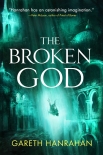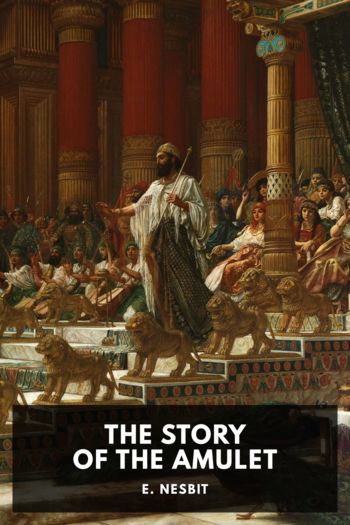The Broken God, Gareth Hanrahan [best historical biographies TXT] 📗

- Author: Gareth Hanrahan
Book online «The Broken God, Gareth Hanrahan [best historical biographies TXT] 📗». Author Gareth Hanrahan
Cari wonders how the sorceress knows all that, but her confusion is eclipsed by the spike of hope. She’s not dead yet.
The dragon snakes forward. “Carillon Thay? Truly?” The monster laughs, and it’s like deafening thunder. “Oh, oh, here is a jest for the ages.” The dragon chuckles and shakes its massive head.
“She’s mine to kill!” roars Artolo.
“No, nephew,” says the dragon, suddenly cold and humourless, “she belongs to me. How was she able to command this ship, I wonder?” The dragon lowers his massive head to the deck and takes a sniff. The rush of air nearly knocks Cari off her feet. “Aaah. Worms.” He draws the word out, making it a low rumble. Flames edge his smile.
“What… what should I do with her, Great-Uncle?” Artolo asks.
“Store her until I decide what to do with her. Put her to work in your camp. Everything is in order there, Artolo, isn’t it?”
“Of course, Great-Uncle.”
“Good.” The dragon’s head turns to address the witch. “That was a worthy suggestion. I commend you. But… you are only Eshdana, and you contradicted the command of a member of my family. Must I remind you of your place?”
The sorceress’ face is hidden by her mask, but she bows her head, kneels before the dragon. Great-Uncle grunts with satisfaction. “Now,” says the dragon. “I have flown long, and I hunger. I must hunt. I shall see you at the refinery, and we shall examine the fruits of your labour.”
The dragon takes off, the beating of its wings cracking the rotten timbers of the worm-ship. He rises above the smouldering wreck of the Rose. He soars over the town of Ushket, his wings darkening the sky, the walkways and rope bridges tearing in the hurricane of his passage. For an instant, he dips out of view – and there’s a flash of fire over the Street of Blue Glass.
Cari, Ren and Adro are marched up the wet muddy hillside towards the hard-packed dirt road, where the carriages wait. A procession of the damned: Adro cursing, shouting at the Eshdana, calling for Ama. Ren grimly silent. Dol Martaine, dragging the child through the mud, one hand clasped over her mouth to keep her from crying out.
On the shore behind them, the few stragglers of the morning-tide Bythos watch them with bemusement, until the Eshdana throw Hawse’s body into the sea.
They’re loaded into the carriages, into the carts, and set off down the road to Ilbarin, the road around the Rock.
And then they’re gone, and the shore is empty again.
Gulls settle on the newest wreck, and burrow in the rotten boards looking for fresh worms.
CHAPTER SEVENTEEN
For all its many great civic buildings, those grand monsters of slate and glass that squat sullenly on the city’s hills, Guerdon is singularly lacking in prisons. There was little need for them in several periods of the city’s history. During the terrible years when Guerdon was under the sway of the Black Iron cult, prisoners were sacrificed to the Ravellers, their souls flensed and consumed by monstrous gods. For more than two centuries, the city was ruled by the Church of the Keepers, who were more concerned with building marble cages up on Holyhill for their own Kept Gods. Criminals were scourged with divine wrath, cursed by the Mother of Mercies. Few prisons were built in that era – but when the Stone Plague struck, those prisons were converted into lithosariums, where the infected were contained until they petrified. Most of those prisons were demolished afterwards, out of fears the plague still lingered in the walls. The rubble of prison and prisoners dumped in the harbour to make sea walls and artificial islands.
The last forty or fifty years, the free city period – again, there was little need for prisons. Effro Kelkin and his Industrial Liberals built a new prison out on Hark Island, a symbol of their war on crime, but that prison rotted once the alchemists’ party took parliament, and the Tallow Vats took over. More efficient to recycle condemned prisoners into enforcers.
All gone now. The Tallow Vats are shut down. The various occupation zones have their own ways of dealing with criminals – Umur’s law-giving sphinxes in the IOZ, something called Supplication in the Haithi district, and the Lyrixians use a prison hulk docked off the New City.
But there’s still one prison left in Guerdon.
The grey walls of the Last House rise up above Baston and Karla.
“I’m going in alone,” says Baston. “You didn’t need to come.”
Karla draws her cloak tightly around herself. “I’m going to wait out here for you, all right? Just remember to keep your head, Bas. You’re there to get what we need to know, that’s it.”
Baston flexes his knuckles. He knows how to get information, all right. The Fever Knight taught him that.
“Stop it,” says Karla. “Just ask him about Mandel’s, and then come back to me.”
“I’ll just talk,” growls Baston. He glances up at the walls of the prison, sees armed guards patrolling. Sinter’s threats run through his mind. We know your sweet little sister. Your sinful mother. Your friends in Pulchar’s bar. We can ruin any of them. He imagines Karla being dragged by the city watch through those prison gates. “You get back to the New City. It’s safer there.”
“Here.” Karla presses a small golden object into his palm. A box, half the length of his thumb, like a little casket or a snuffbox.
“I’ve got the dragon’s gold for bribes.” The bag’s heavy on his belt. Even with the value of gold debased by miracles, there’s still a fortune in there, more money than Baston’s ever carried.
“That’s from Mum. It’s for him, all right. Do it for her.”
Baston scowls. His mother’s admiration for the old guildmaster is a point of contention between them. He puts the little golden box into his pocket.
“Be quick.”
Baston advances into the shadow of the Last House. Guards at the gate usher him through a side door





Comments (0)